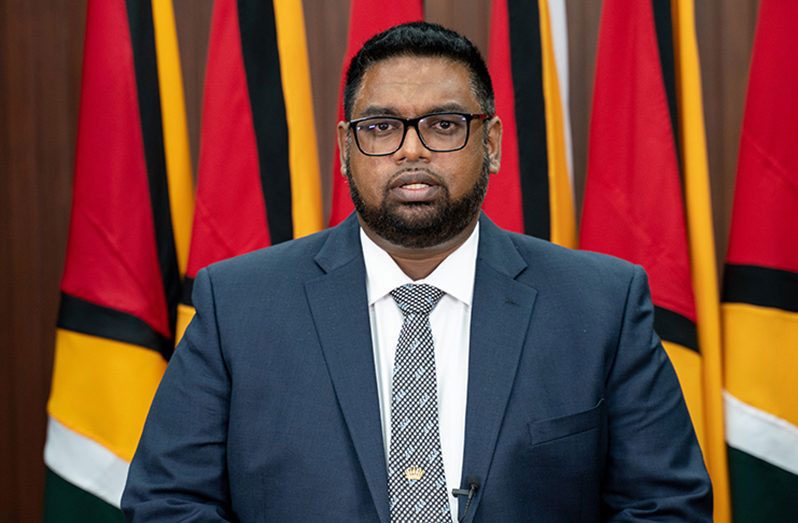–says he will do whatever the Constitution requires
PRESIDENT Dr. Irfaan Ali says he is not opposed to meeting with Opposition Leader Joseph Harmon, as is constitutionally required, in relation to a number of matters, including the substantive appointments of several constitutional officers such as the Chancellor of the Judiciary, the Chief Justice, and the Commissioner of Police.
At a virtual press conference on Friday, Dr. Ali told reporters that he is “fully committed to abiding by every aspect of the Constitution”, and that there are no preconditions to fulfilling his mandate of engaging the Opposition Leader.
The Head of State did not specify if and when he intends to meet Harmon.

Dr. Ali did, however, point to the fact that the main parliamentary opposition, the A Partnership for National Unity + Alliance for Change (APNU+AFC) does not view the People’s Progressive Party/Civic Government as legitimate.
“This is outside of that mandate in relation to my constitutional role, where you have someone who is continuously saying that this government is illegitimate, so he has a moral problem,” Dr. Ali said.
He went further to question Harmon’s rationale for engaging a government that is, to his mind, illegitimate. “That’s his moral problem; and that has exposed his duplicity,” President Ali argued.
The Commander-In-Chief of the Armed Forces had previously said that he is ready to consult with the Opposition Leader, but insisted that Harmon must first recognise who he is meeting.
President Ali had previously said that the requirement for Harmon to acknowledge him as the elected Head of State is not a condition, but a fact. “If I want to talk to this gentleman, and I don’t recognise him as someone in the media, then, who am I talking to, if I want to talk to him as a media personnel,” Dr. Ali noted in a previous example.
For context, as mandated by Article 127 of the Constitution of Guyana, the Chancellor of the Judiciary and the Chief Justice can only be confirmed by the President, acting after obtaining the agreement of the elected Leader of the Opposition.
Article 124 of the Constitution explicitly states that the Chancellor shall be the President of the Court of Appeal. The Chief Justice, on the other hand, is the President and most senior judge of the High Court.
The position of Chancellor is one of utmost importance. Pursuant to Article 95 of the Constitution, during any period when the office of the President is vacant, the office shall be assumed by the Prime Minister, or if there is no Prime Minister, a minister as elected by Cabinet may assume the position. However, when there is no Cabinet, the Chancellor will act in the role.
In March 2018, Justice Yonette Cummings-Edwards and Justice Roxane George were sworn in to perform the functions of acting Chancellor of the Judiciary, and acting Chief Justice, respectively.
No Chancellor or Chief Justice has been confirmed in the positions since 2001; Justice Cummings-Edwards took up the mantle following the retirement of Justice Carl Singh, while Justice George was elevated to the post following the retirement of the late Justice Ian Chang, SC.
The long-overdue meeting between Harmon and President Ali has also stalled the confirmation of Nigel Hoppie as the Commissioner of Police.
Meanwhile, asked about the pending appointments of members of the Judicial Service Commission (JSC), President Ali said that this, in addition to the installation of several State boards, will be dealt with as priority, once he returns from the 26th United Nations’ climate change conference being hosted in Glasgow, Scotland.
The appointment of several other officers is also dependent on the operations of the JSC.
The JSC, by legal definition, is the guardian of Guyana’s judicial autonomy. The Commission is responsible for making recommendations for judicial appointments, and removing or exercising disciplinary control over persons holding or acting in judicial offices.
The Chancellor and the Chief Justice are ex-officio members of the JSC, which also includes the Chairman of the Guyana Public Service Union, (GPSU), as well as a member appointed by Parliament, and another by the President.
The Commission, according to the law, is not to be subject to the direction or control of any other person or authority.




.png)









